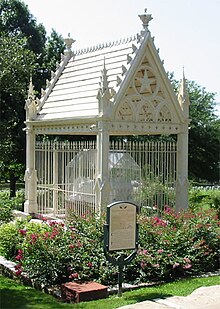Albert S. Johnston
Albert Sidney Johnston (born February 2, 1803 in Washington , Mason County , Kentucky , † April 6, 1862 in the Battle of Shiloh ) was an officer in the US Army , general in the Texas Army and in the Confederate Army during the American Civil War .
Life
Early years
Johnston lived most of his life in Texas , which, although born in Kentucky, considered it his home. He received his first training at Transylvania University in Lexington . One of his fellow students was the future President of the Confederation , Jefferson Davis . Both were at the Military Academy in West Point called Davis, however, two years after Johnston. In 1826 he joined the Academy in eighth in his class and was as Brevet - Lieutenant offset from the second Infantry Regiment. In the Black Hawk War , he served as General Henry Atkinson's chief of staff . Johnston married in 1829 and left the army in 1834 to care for his wife, who had tuberculosis .
Texan War of Independence
After their death, Johnston began operating a farm in Texas. At the beginning of the Texas War of Independence , he joined the Texas Army as a private in 1836, was promoted to major a month later and served as aide-de-camp for General Sam Houston . Johnston was promoted to General Adjutant and Colonel in August 1836 . As early as January 31, 1837, as Brigadier General, he became Commander-in-Chief of the Texan Army. A few days later he dueled Brigadier General Felix Huston for the same position. He lost the duel because he refused to fire at his opponent and was wounded himself. Johnston was named Secretary of War by the second President of the Republic of Texas , Mirabeau B. Lamar , in 1838 . In February 1840 he resigned, remarried and ran a large plantation in Brazoria County .
Mexican-American War
At the beginning of the Mexican-American War , Johnston returned to the Texas Army as commander of the 1st Texas Rifles Regiment with the rank of colonel. He managed to keep most of his subordinate soldiers on duty before the Battle of Monterrey , even though their draft period had expired. Johnston also fought in the Battle of Buena Vista . After the war he returned to his plantation.
US President Zachary Taylor , his commander in the last war, appointed Johnston with the rank of major as paymaster in the US army in 1849. Six years later he was appointed commander of the 2nd U.S. Cavalry Regiment. His deputy was Lieutenant Colonel Robert E. Lee . He was awarded the Brevet Brigadier General Rank for his services during the suppression of the Mormon rising. Towards the end of 1860 he became commander of the Pacific Defense Area.
Civil war
Johnston was considered one of the most capable officers on both sides at the beginning of the Civil War. After Texas left the Union, he returned his officer license because he did not want to fight against his state and went to Richmond , Virginia . His friend, President Jefferson Davis , promoted him to general and placed him in command of the western theater of war. In the ranking of the Confederate Army, Johnston was the second highest general after Adjutant General Samuel Cooper .
In contrast to the eastern theater of war, Johnston had a huge front to defend from the Appalachians to the Mississippi . Errors in the selection of commanders and the deployment of troops ordered to him led to the loss of Tennessee in early 1862 . Johnston now came under criticism of the press, but President Davis stuck to Johnston. At the Battle of Shiloh he managed to attack the US forces under Major General Ulysses S. Grant by surprise. Johnston was everywhere on the battlefield, always personally leading the soldiers into battle. While conducting such an attack, he was wounded in the leg. Johnson had sent his doctor away to check on the wounded. His wound, which he initially considered insignificant, resulted in death - Johnston bled to death. The fatal shot was probably fired by a Confederate soldier because no US troops were in range at the time of the attack. After Grant received reinforcements, Johnston's forces were pushed back on the second day.
Johnston's death was a major moral setback for the South; President Davis, who considered Johnston to be the best field officer in the country, saw the loss as a negative turning point and said, "I knew our strongest pillar was broken." It was not until General Robert E. Lee that he found an officer who was in the It was able to offer long-term resistance to the Union troops .
He is not related to General Joseph E. Johnston .
literature
- Charles P. Roland: Albert Sidney Johnston: Soldier of Three Republics . Austin, TX 1964.
Web links
- Albert Sidney Johnston in the database of Find a Grave (English)
| personal data | |
|---|---|
| SURNAME | Johnston, Albert S. |
| ALTERNATIVE NAMES | Johnston, Albert Sidney (full name) |
| BRIEF DESCRIPTION | General in the Confederate Army |
| DATE OF BIRTH | February 2, 1803 |
| PLACE OF BIRTH | Washington , Kentucky |
| DATE OF DEATH | April 6, 1862 |
| Place of death | Battle of Shiloh |

